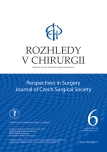-
Medical journals
- Career
Bleeding from lumbar ventral epidural venous plexus managed with hemostatic agent from oxidized non-regenerated cellulose
Authors: R. Hart
Authors‘ workplace: Klinika traumatologie Lékařská fakulty Masarykovy univerzity, Úrazová nemocnice v Brně ; Ortopedicko-traumatologické oddělení nemocnice Znojmo
Published in: Rozhl. Chir., 2019, roč. 98, č. 6, s. 245-247.
Category: Original articles
Overview
Introduction: Bleeding from epidural blood vessels may be an unpleasant complication during surgery of the lumbar spine, which is often difficult to manage with electrocoagulation. The use of local hemostatic agents is a possible solution. This paper presents the first experience with an agent of oxidized non-regenerated cellulose.
Methods: The agent of oxidized non-regenerated cellulose was used in 21 patients (12 women and 9 men) to stop bleeding from the ventral epidural lumbar venous plexus. It was always removed before the end of the operation.
Results: In all cases, bleeding was stopped within 2 minutes. Bleeding did not recur until the end of surgery (even after removal of the agent). No early or other complications were observed in the patients studied.
Conclusion: The agent of oxidized non-regenerated cellulose appears to be a rational and effective solution for bleeding from epidural veins in the lumbar spine.
Keywords:
bleeding – lumbar spine – epidural vessels – hemostatic agents – oxidized cellulose
Sources
-
Schouten ES, ven de Pol AC, Schoulen AN, et al. The effect of aprotinin, tranexamid acid, and amimocaproic acid on blood loss and use of blood products in major pediatric surgery: a meta-analysis. Pediatr Crit Care Med. 2009;10 : 182−90. doi: 10.1097/PCC.0b013e3181956d61.
-
Hickerson WL, Nur I, Meidler R. A comparison of the mechanical, kinetic, and biochemical properties of fibrin sealants. Blood Coagul Fibrinolysis 2011;22 : 19−33. doi: 10.1097/MBC.0b013e32833fcbfb.
-
Horsley V. Antiseptic wax. BMJ 1892;1 : 1165.
-
Cirak B, Unal O. Iatrogenic quadruplegia and bone wax. Case illustration. J Neurosurg. 2000;92(Suppl):248.
-
Wilkinson HA, Baker S, Rosenfeld S. Gelfoam paste in experimental laminectomy and cranial trephination: hemostasis and bone healing. J Neurosurg. 1981;54 : 664−7. doi: 10.3171/jns.1981.54.5.0664.
-
Epstein NE, Silvergleid RS, Hollingsworth R. Increased postoperative cervical myelopathy and cord compression resulting from the use of Gelfoam. Spine J. 2009;9 : 19−21. doi: 10.1016/j.spinee.2008.03.009.
-
Ferschl MB, Roklina MD. Thromboemboli, acute right heart failure and disseminated intravascular coagulation after intraoperative application of a topical hemostatic matrix. Anesth Analg. 2009;108 : 434−6. doi: 10.1213/ane.0b013e31818d3f48.
-
Kennedy HP. Familial hemorrhagic telangiectasia with a note on the use of oxidized cellulose gauze as a hemostatic agent in epistaxis. N Engl J Med. 1947;237 : 180−3. doi: 10.4103/1947-2714.153928 doi.
-
Levy ML, Diaz JD, Fukushima T, et al. Surgicel fibrillar absorbable oxidized regenerated cellulose. Neurosurgery 1997;41 : 701−2.
-
Henry MC, Tashjian DB, Kasowski H, et al. Postoperative paraplegia secondary to the use of oxidized cellulose. J Pediatr Surg. 2005;40 : 9−11. doi: 10.1016/j.jpedsurg.2005.01.032.
Labels
Surgery Orthopaedics Trauma surgery
Article was published inPerspectives in Surgery

2019 Issue 6-
All articles in this issue
- Development of vascular substitutes for low-flow peripheral bypass grafting – a review
- Splanchnic vein closures
- Bleeding from lumbar ventral epidural venous plexus managed with hemostatic agent from oxidized non-regenerated cellulose
- Catheter laser ablation of superficial veins of the lower extremities in the symptomatic treatment of venous reflux − comparison of the immediate results of two types of laser
- Iatrogenic thoracic aortic injury in esophagectomy – a case report and literature review
- Mladí, chcete operovat? Přidejte nám na důchody!
- Combined endovascular and surgical treatment of symptomatic tandem occlusion of common carotid artery and middle cerebral artery – case repor
- Madelung’s disease – a case report
- Perspectives in Surgery
- Journal archive
- Current issue
- Online only
- About the journal
Most read in this issue- Madelung’s disease – a case report
- Splanchnic vein closures
- Combined endovascular and surgical treatment of symptomatic tandem occlusion of common carotid artery and middle cerebral artery – case repor
- Development of vascular substitutes for low-flow peripheral bypass grafting – a review
Login#ADS_BOTTOM_SCRIPTS#Forgotten passwordEnter the email address that you registered with. We will send you instructions on how to set a new password.
- Career

